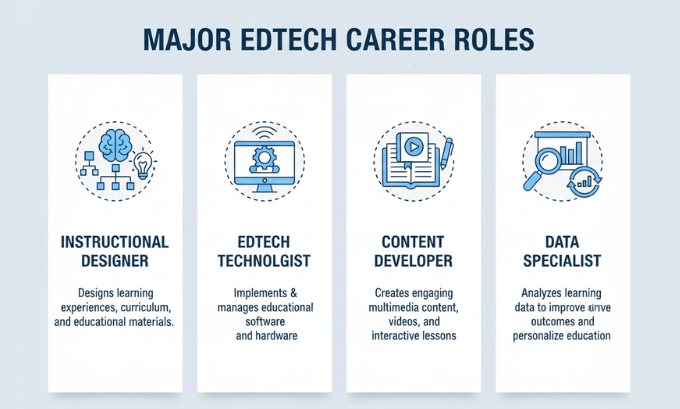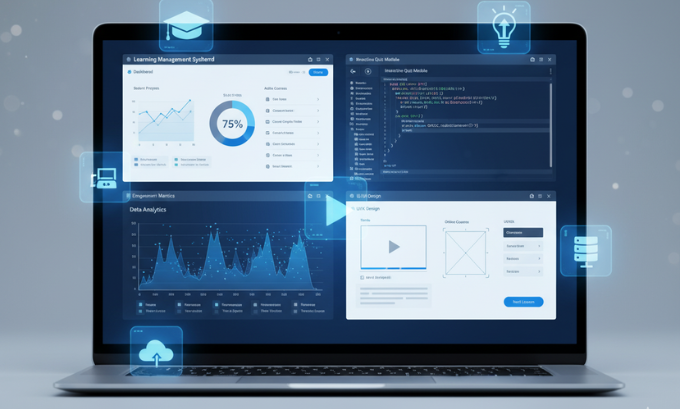The education technology sector is experiencing unprecedented growth, creating exciting opportunities for professionals seeking meaningful careers at the intersection of learning and innovation. Education technology jobs have evolved from simple IT support roles into sophisticated positions that shape how millions of students learn worldwide.
The COVID-19 pandemic accelerated digital transformation in education, making EdTech professionals more essential than ever. From curriculum designers creating interactive learning experiences to educational technologists implementing cutting-edge classroom solutions, these roles offer both professional fulfillment and excellent career prospects.
Education technology careers have become particularly attractive for educators looking to expand their impact beyond traditional classrooms while leveraging their deep understanding of learning processes.
Table of Contents
What Makes Education Technology Jobs So Compelling
Education technology jobs represent a unique convergence of pedagogical expertise and technological innovation. These positions allow professionals to directly influence how students engage with learning materials, making abstract concepts tangible through interactive experiences.

The field encompasses diverse specializations, from instructional design to learning analytics, each offering distinct pathways for career advancement. Educational technologists work across multiple sectors including K-12 schools, higher education institutions, corporate training departments, and EdTech startups.
The COVID-19 Catalyst
The pandemic fundamentally transformed education delivery, creating massive demand for digital learning solutions. Schools worldwide needed professionals who could rapidly deploy distance learning resources and train teachers on new technologies. This shift established EdTech as an essential function rather than a supplementary service.
Remote learning highlighted the critical need for user-friendly educational platforms, personalized learning paths, and robust digital infrastructure. Educational technology professionals became the architects of this transformation, designing systems that could maintain educational continuity during unprecedented disruption.
Key Education Technology Job Categories
Instructional Design Positions
Instructional designers create structured learning experiences that combine educational theory with practical application. They analyze learning objectives, design curriculum frameworks, and develop assessment strategies that measure student progress effectively.
These professionals work closely with subject matter experts to transform complex concepts into digestible learning modules. They utilize tools like Articulate Storyline, Adobe Captivate, and various Learning Management Systems to create engaging educational content.
Advanced instructional design roles often require master’s degrees in Learning Design and Technology, providing the theoretical foundation necessary for sophisticated curriculum development.

Educational Technology Implementation Specialists
Technology integration specialists bridge the gap between cutting-edge educational tools and practical classroom application. They evaluate emerging technologies, develop implementation strategies, and provide ongoing support to educators.
These roles require deep understanding of both pedagogical principles and technical systems. Specialists must assess how tools like interactive whiteboards, student response systems, and virtual reality applications can enhance specific learning objectives.
The International Society for Technology in Education (ISTE) provides professional standards that guide these specialists in creating meaningful technology integration plans.
Learning Analytics and Data Specialists
Data-driven decision making has revolutionized education, creating demand for professionals who can extract meaningful insights from student performance data. Learning analytics specialists design systems that track student engagement, identify at-risk learners, and optimize curriculum effectiveness.
These positions require statistical analysis skills combined with educational expertise. Professionals use tools like Tableau, R, and Python to create dashboards that help educators understand learning patterns and intervention opportunities.
Digital Content Developers
Content developers create interactive learning materials that engage students across various subjects and grade levels. They work with multimedia elements including video, audio, animations, and interactive simulations to enhance learning experiences.
Modern content development often involves collaborating with game designers to create educational games that make learning enjoyable while maintaining rigorous academic standards. Popular platforms like Kahoot and Quizlet demonstrate how gamification can transform traditional review activities.
Corporate Training Specialists
Corporate EdTech professionals design professional development programs that help employees acquire new skills efficiently. They create onboarding experiences, compliance training modules, and leadership development programs.
These roles often involve working with enterprise Learning Management Systems and creating mobile-friendly content that accommodates busy professional schedules. Corporate training specialists must understand adult learning principles and organizational change management.
Essential Skills for Education Technology Careers

Technical Competencies
Successful EdTech professionals combine educational expertise with technical proficiency. Essential technical skills include:
- Learning Management System Administration: Platforms like Canvas, Blackboard, and Moodle
- Content Creation Tools: Adobe Creative Suite, Articulate 360, Camtasia
- Data Analysis Software: Excel, Tableau, Google Analytics
- Web Development Basics: HTML, CSS, basic JavaScript understanding
- Educational Apps and Platforms: Familiarity with tools like Google Apps for Education, Microsoft Teams for Education
Pedagogical Understanding
Technology without educational foundation fails to create meaningful learning experiences. EdTech professionals must understand learning theories, assessment strategies, and curriculum design principles.
Knowledge of differentiated instruction helps professionals create solutions that accommodate diverse learning styles and abilities. Understanding of Universal Design for Learning ensures that educational technology serves all students effectively.
Communication and Collaboration Skills
EdTech roles require extensive collaboration with educators, administrators, students, and technical teams. Professionals must translate complex technical concepts into language that non-technical stakeholders can understand.
Project management skills become essential when coordinating large-scale technology implementations or curriculum development initiatives. Many positions require presenting to school boards, training large groups of educators, or leading cross-functional teams.
Salary Expectations and Career Progression
Entry-Level Positions
Starting salaries in education technology typically range from $45,000 to $65,000, depending on location and specific role requirements. Entry-level positions like Educational Technology Support Specialist or Junior Instructional Designer provide excellent foundations for career growth.
These positions often include comprehensive benefits packages, professional development opportunities, and the satisfaction of directly impacting student learning outcomes. Career advancement opportunities are abundant for professionals who demonstrate both technical competence and educational insight.
Mid-Level Professional Roles
Experienced EdTech professionals earn between $65,000 and $95,000 annually. Positions like Senior Instructional Designer, Educational Technology Coordinator, or Learning Analytics Manager offer increased responsibility and strategic influence.
These roles often involve leading teams, managing budgets, and making decisions that affect entire educational organizations. Professionals at this level frequently present at conferences and contribute to educational technology research.
Senior Leadership Positions
Director-level positions in education technology command salaries from $95,000 to $150,000 or more. These roles involve strategic planning, vendor relationships, and organizational change management.
Chief Learning Officers and Educational Technology Directors shape institutional technology vision and oversee multimillion-dollar implementation projects. Professional development in these roles often includes executive education programs and industry leadership opportunities.
Industry Sectors Hiring EdTech Professionals
K-12 School Districts
Public and private school systems represent the largest employment sector for educational technology professionals. Districts need specialists who can support classroom teachers, maintain educational technology infrastructure, and develop digital curricula.
School-based positions often include excellent benefits, stable employment, and direct impact on student learning. Many districts offer professional development funds and opportunities for advanced degree completion.
Higher Education Institutions
Universities and colleges employ EdTech professionals in various capacities, from faculty support to large-scale online program development. These positions often combine practical implementation with research opportunities.
Higher education roles frequently offer access to cutting-edge technologies, collaboration with faculty researchers, and opportunities to publish educational technology research. Academic calendar schedules provide flexibility that many professionals value highly.
Educational Technology Companies
Private EdTech companies offer dynamic environments where professionals can shape products used by millions of learners worldwide. Companies like Duolingo, Khan Academy, and Coursera employ instructional designers, product managers, and learning scientists.
These positions often include competitive compensation packages, stock options, and opportunities to work with innovative technologies. The fast-paced startup environment appeals to professionals who enjoy rapid iteration and direct user feedback.
Government and Military Training
Federal and state agencies require educational technology expertise for employee training programs, public education initiatives, and military training systems. These positions often include security clearance requirements and specialized training opportunities.
Government roles typically offer excellent job security, comprehensive benefits, and opportunities to work on large-scale projects that serve public interests. Military training positions often involve advanced simulation technologies and high-stakes learning environments.
Non-Profit Organizations
Educational non-profits employ EdTech professionals to develop programs that serve underserved populations, create open educational resources, and advance educational equity. Organizations like Khan Academy and edX demonstrate how technology can democratize access to high-quality education.
These roles often provide deep mission alignment and opportunities to address educational inequality through technology solutions. Many non-profit positions offer loan forgiveness programs and other benefits that support public service careers.
Educational Pathways and Professional Development
Academic Degree Programs
While not always required, formal education significantly enhances career prospects in educational technology. Master’s degree programs in Learning Design and Technology provide comprehensive foundations in both educational theory and technical implementation.
Popular degree concentrations include:
- Instructional Design and Technology
- Educational Leadership with Technology Focus
- Learning Analytics and Data Science
- Digital Media and Learning
Many programs offer online completion options, allowing working professionals to advance their education while maintaining current positions.
Professional Certifications
Industry certifications demonstrate specialized expertise and commitment to professional development. Valuable certifications include:
- Google for Education Certified Trainer
- Microsoft Certified Educator
- Adobe Certified Expert in eLearning
- Certified Professional in Learning and Performance (CPLP)
- Project Management Professional (PMP)
Continuous Learning Requirements
Educational technology evolves rapidly, requiring professionals to maintain current knowledge of emerging trends and tools. Professional development activities include:
- Conference Attendance: Events like ISTE, DevLearn, and regional EdTech conferences
- Online Learning: Platforms offering courses in specific tools and methodologies
- Professional Association Membership: Organizations providing networking and resource access
- Vendor Training: Specialized training on specific educational technology platforms
Staying current with industry trends ensures professionals remain competitive and effective in their roles.
Building Your EdTech Career: Practical Next Steps
Portfolio Development
Successful EdTech professionals showcase their capabilities through comprehensive portfolios demonstrating both technical skills and educational impact. Effective portfolios include:
- Sample Learning Modules: Interactive content demonstrating design capabilities
- Implementation Case Studies: Documentation of successful technology integration projects
- Assessment Tools: Examples of evaluation instruments and data analysis
- Research Projects: Evidence of educational technology research or evaluation activities
Networking Strategies
Professional relationships drive career advancement in education technology. Effective networking approaches include:
- Social Media Engagement: Active participation in EdTech Twitter chats and LinkedIn groups
- Conference Participation: Presenting at professional conferences and workshops
- Local Meetups: Participating in regional educational technology user groups
- Online Communities: Contributing to forums and discussion boards focused on educational technology
Gaining Relevant Experience
Breaking into education technology often requires creative approaches to gaining relevant experience:
- Volunteer Projects: Offering technical assistance to local schools or non-profits
- Freelance Opportunities: Taking on small instructional design or training projects
- Cross-Training: Leveraging existing skills in education, technology, or training
- Internships: Pursuing formal internship programs with EdTech companies or organizations
Professional development opportunities abound for individuals willing to demonstrate initiative and commitment to the field.
Emerging Trends Shaping Future Opportunities
Artificial Intelligence in Education
AI-powered educational tools are creating new categories of EdTech positions. Professionals who understand both AI capabilities and educational applications will find increasing opportunities in personalized learning systems, intelligent tutoring platforms, and automated content generation.
Machine learning specialists with educational backgrounds are particularly valuable for developing systems that adapt to individual learning styles and preferences.

Virtual and Augmented Reality Applications
Immersive technologies are transforming how students experience abstract concepts and historical events. EdTech professionals who can design VR/AR learning experiences and implement these technologies in educational settings will find growing demand for their expertise.
Blockchain and Credentialing Systems
Digital credentials and blockchain-based certification systems are reshaping how educational achievements are verified and transferred. Professionals who understand both the technical implementation and educational implications of these systems will find unique career opportunities.
Microlearning and Mobile Education
The shift toward bite-sized learning experiences and mobile-first educational design creates demand for specialists who can create effective microlearning curricula and optimize educational content for mobile devices.
Understanding these emerging trends positions professionals for long-term career success in the evolving EdTech landscape.
Overcoming Common Career Challenges
Bridging Education and Technology Cultures
Many EdTech professionals struggle with cultural differences between education and technology sectors. Success requires developing fluency in both educational terminology and technical concepts while serving as a translator between these communities.
Managing Rapid Technology Changes
The pace of technological change can overwhelm professionals trying to stay current. Successful EdTech careers require strategic focus on fundamental principles while selectively adopting new tools that genuinely enhance learning outcomes.
Demonstrating Educational Impact
Unlike purely technical roles, EdTech positions require demonstrating impact on learning outcomes rather than just technical implementation success. Professionals must develop skills in educational assessment and data analysis to prove their contributions to student success.
Balancing Innovation with Practical Constraints
Educational institutions often have limited resources and conservative adoption patterns. EdTech professionals must balance innovative vision with practical implementation realities, including budget constraints, training requirements, and organizational change management.
Successful navigation of these challenges requires patience, strategic thinking, and commitment to both educational excellence and technological innovation.
Frequently Asked Questions
What educational background do I need for EdTech careers?
While requirements vary by position, most roles benefit from either educational experience or technical expertise, with many positions preferring both. A bachelor’s degree is typically minimum requirement, with master’s degrees in instructional design, educational technology, or related fields providing significant advantages.
Are EdTech jobs limited to traditional schools?
No, educational technology professionals work across diverse sectors including corporate training, healthcare education, government agencies, non-profits, and private EdTech companies. The skills transfer well across different learning environments.
How important is classroom teaching experience?
Teaching experience provides valuable perspective on learner needs and classroom dynamics, but it’s not always required. Many successful EdTech professionals come from backgrounds in training, technical writing, web development, or other related fields.
What’s the job outlook for education technology careers?
The Bureau of Labor Statistics projects strong growth in education-related technology positions, driven by continued digital transformation in education and growing emphasis on data-driven instruction. The field offers excellent long-term career prospects.
How can I transition into EdTech from another field?
Successful transitions often involve identifying transferable skills, gaining relevant experience through volunteer work or side projects, pursuing relevant certifications or education, and networking within the EdTech community. Many professionals successfully transition from teaching, corporate training, web development, or other related fields.
What technical skills are most important to develop?
Key technical skills include Learning Management System administration, content creation software proficiency, basic web development knowledge, data analysis capabilities, and familiarity with emerging educational technologies. The specific skills needed vary by role and organization.
Do I need programming skills for EdTech careers?
While programming skills are valuable, they’re not required for all EdTech positions. Instructional designers, training coordinators, and educational consultants often succeed without extensive programming knowledge. However, basic technical literacy and willingness to learn new tools are essential.
Your Path Forward in Education Technology
Education technology jobs offer the unique opportunity to combine technological innovation with meaningful educational impact. Whether you’re an experienced educator looking to expand your influence or a technology professional seeking more purposeful work, the EdTech field provides diverse pathways for career fulfillment.
The sector’s continued growth, driven by ongoing digital transformation and evolving learning needs, ensures abundant opportunities for dedicated professionals. Success in education technology requires commitment to both technical excellence and educational effectiveness, along with the flexibility to adapt to rapidly changing technological landscapes.
Start your EdTech journey today by exploring distance learning resources that can help you develop relevant skills, connecting with professionals in the field, and identifying organizations that align with your career goals and educational values.
The future of learning depends on skilled professionals who can bridge the gap between cutting-edge technology and effective education. Your expertise and passion can help shape how millions of students learn and grow in our increasingly digital world.

